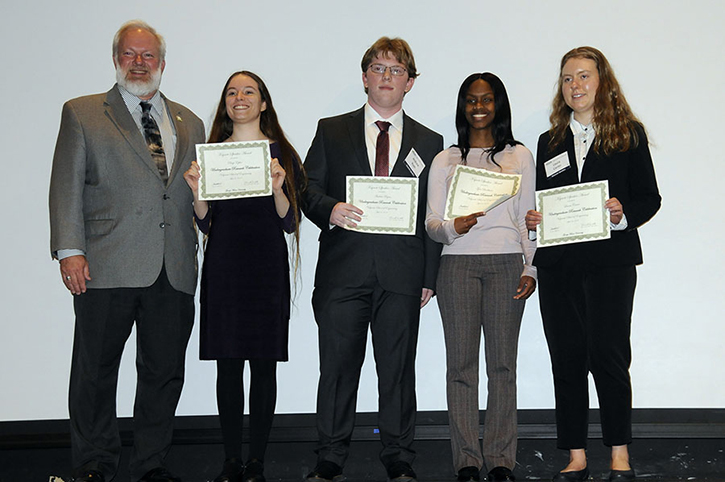
The Spinamics with Volgenau School of Engineering Dean Ken Ball (far left) at the Undergraduate Research Celebration on April 16, where they were selected as keynote speakers. Team members (starting second from left) are Paige Epler, Andrew Ryan, Tyra Bookhart and Laura Carter. Photo provided.
Four recent George Mason University alumni have devised a mechanism that improves minimally invasive brain and spinal surgery, and they’re optimistic that it can eventually be a useful tool in the medical field.
The recent Volgenau School of Engineering graduates—bioengineering majors Paige Epler, Andrew Ryan, Tyra Bookhart and Laura Carter—created an automated tubular dilator for their senior capstone project that simplifies the surgical process for minimally invasive brain and spinal surgery, simultaneously reducing the steep learning curve for surgeons and minimizing the risk of complications. Still in its early stages, their computer-assisted surgical invention automatically dilates the incision site in a short amount of time, replacing numerous manual steps.
The team, which calls itself the Spinamics, was searching for a capstone project at the start of fall 2018 when they accepted a challenge from Inova neurosurgeon Mahesh Shenai to improve surgical precision for brain and spinal surgery.
Working from the bioengineering lab at the new Peterson Family Health Sciences Hall, they came up with the automated tubular dilator, a device that decreases the likelihood of human error, making surgery more accurate while reducing chances of complications. The current method of dilating incision sites is difficult and requires multiple steps. If not done correctly, the process could lead to sepsis, a life-threatening condition that occurs when the body’s own reaction to infection causes injuries to its own tissues and organs, Epler said.
“[With our device], not only could we decrease the element of human error and hopefully lessen the risk of complications,” she said, “but we could also make it a much easier procedure for surgeons to learn.”
The students used different types of gelatin to simulate neural tissues during their tests while under the supervision of faculty advisors, Shenai, who is also an affiliated professor of bioengineering; Feitian Zhang, assistant professor of electrical and computer engineering; and Qi Wei, an associate professor of bioengineering. They hope to test their device on cadavers and eventually move into clinical trials.
“The students took up the challenge of an open engineering problem,” Wei said. “They went from knowing little about the project to coming up with a functional prototype.”
For their efforts, the student quartet was the awarded the 2019 Volgenau School of Engineering Research Award in April. While all four graduated with bachelor’s degrees in May, Epler and Ryan plan to continue working on it even as they begin graduate school this fall.
“I would be very happy if this would be refined in the future for actual medical usage,” Epler said. “I think there’s a lot of potential to really improve brain and spine surgery if we continue working this device.”
“I feel like we’re making a difference with it,” Ryan said. “If we can get it to a point where we can get it to clinical trials and start seeing positive results, that’d be pretty humbling.”
